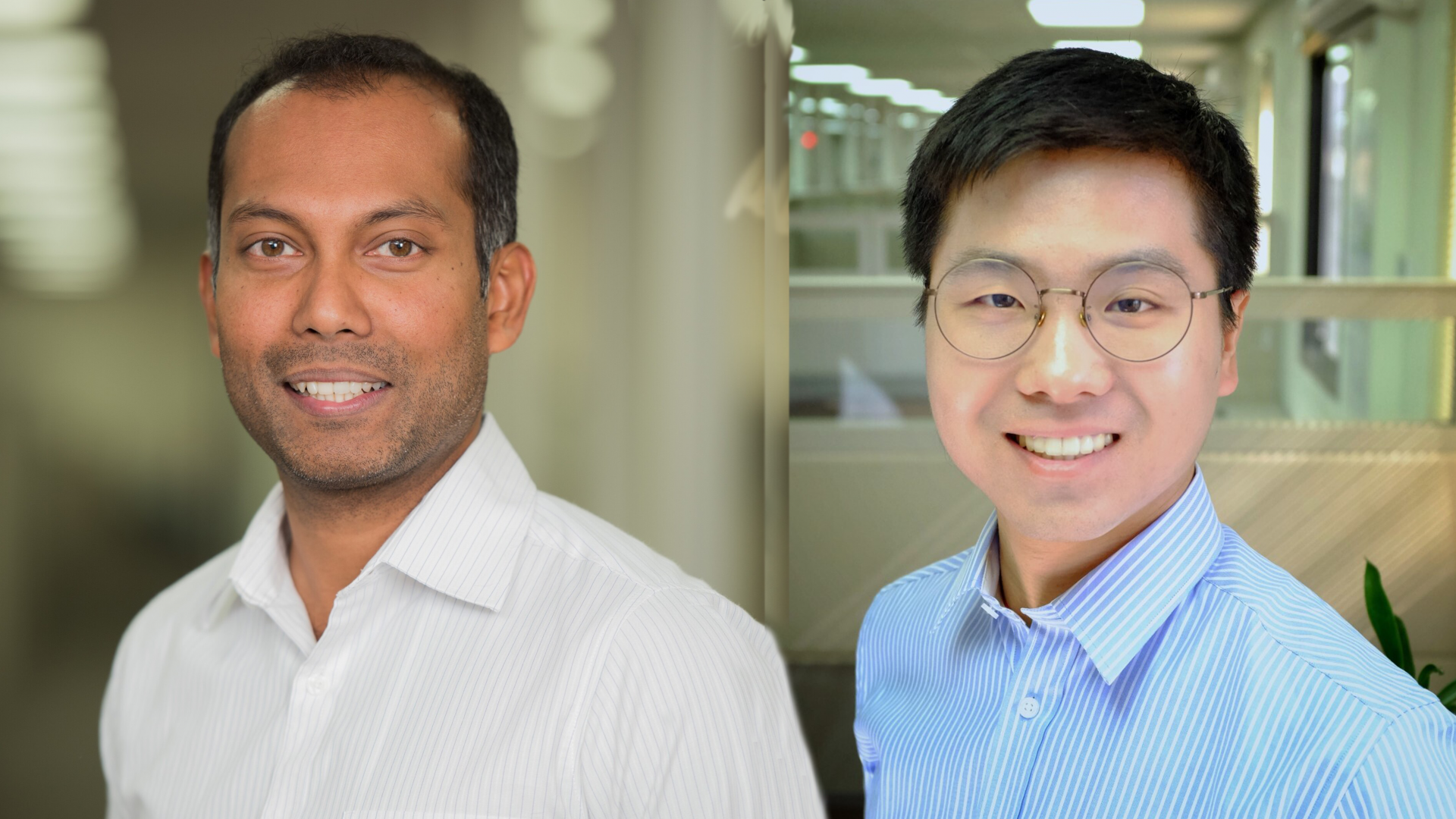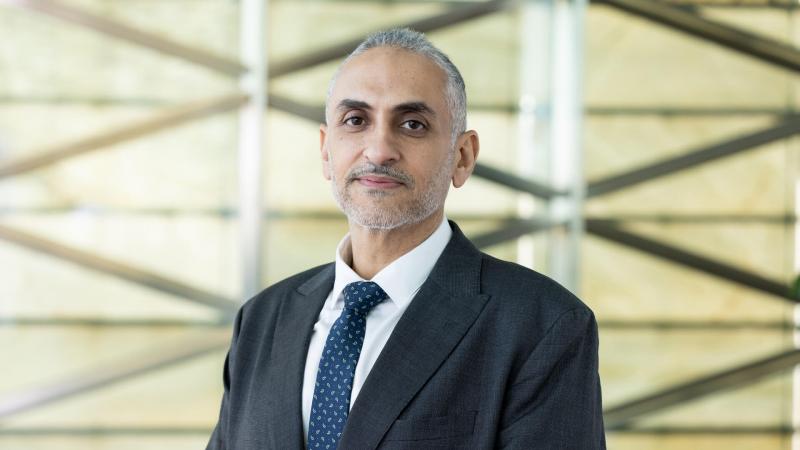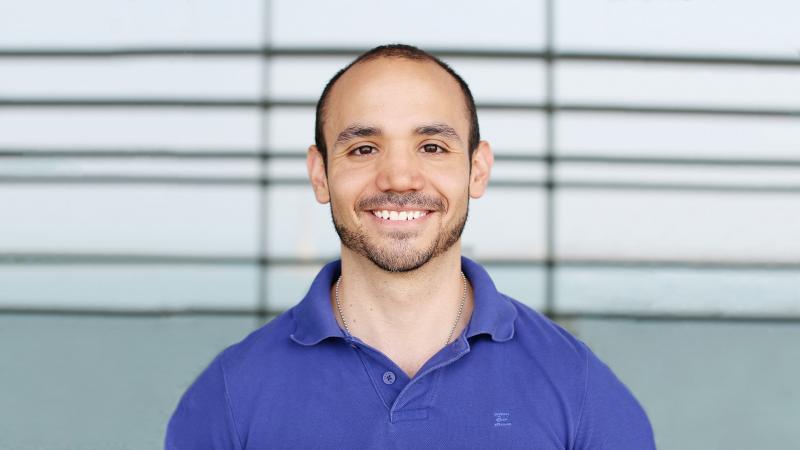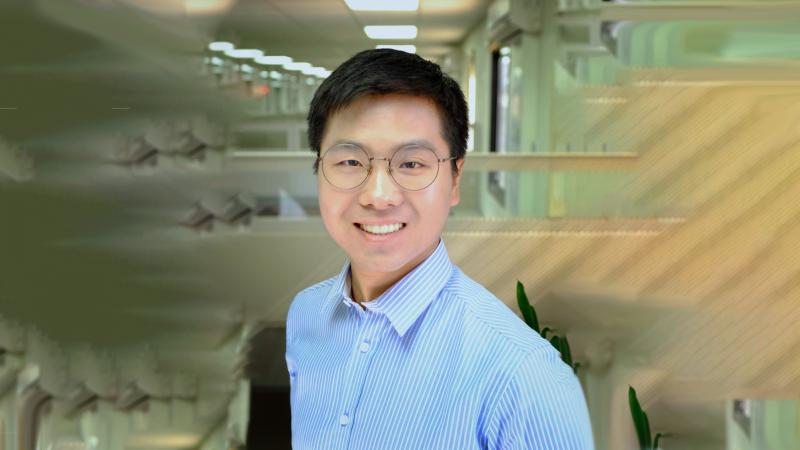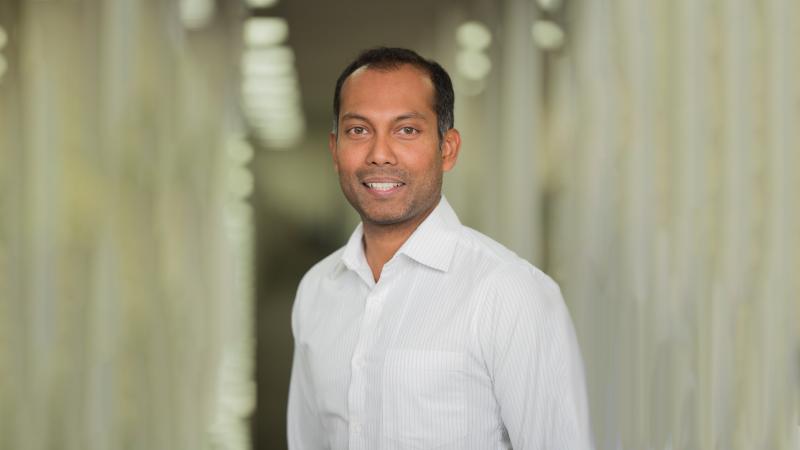By David Murphy
KAUST alumni Dr. Chinthaka Gooneratne and Dr. Bodong Li both recently received Society of Petroleum Engineers (SPE) 2020 Regional Awards for the Middle East and North Africa Region. Gooneratne won the Regional Drilling Engineering Award, while Li was awarded the Regional Formation Evaluation Award.
The SPE regional awards recognize members who “contribute exceptional service and leadership within SPE, as well as making significant professional contributions within their technical disciplines at the SPE regional level.” As 2020 regional award recipients, both researchers automatically become candidates for the equivalent international award in 2021.
Before joining Saudi Aramco, Gooneratne (a former KAUST postdoctoral fellow) and Li (a former KAUST M.S./Ph.D. student) worked under the supervision of Professor Jürgen Kosel in the KAUST Sensing, Magnetism and Microsystems (SMM) research group. Presently, the researchers are based in the Saudi Aramco’s Exploration and Petroleum Engineering Center - Advanced Research Center (EXPEC ARC), conducting research with a focus on upstream oil and gas technology development.
“I am truly honored to be the recipient of the SPE Regional Drilling Engineering Award,” Gooneratne said of his award. “The SPE has been at the forefront in driving the need to reflect, learn, prepare, and be more effective in harnessing and adopting the technology that will drive the oil and gas industry,” he added.
Of his award, Li noted: “I feel extremely honored to receive the SPE Regional Formation Evaluation Award. I am very glad that I can contribute to the oil and gas industry through my research work at Saudi Aramco.”
“The success story of the project that brought me this award—leading the development of a miniaturized downhole sensing platform (a drilling microchip)—has helped to expand my research goal: to revolutionize the ways we access information in the upstream oil and gas industry,” he added.
Pushing the boundaries of technological innovation at Saudi Aramco
As a technical leader for Sensors and Internet of things (IoT) at Saudi Aramco, Gooneratne uses his expertise to design and develop surface and downhole sensor systems, including mobile micro-electromechanical systems (MEMS) sensors, downhole communication systems and their integration onto IoT edge platforms. These systems enable actionable insight in real-time, at the point of data collection, and serve to optimize drilling operations.
Earlier this year, one of these newly developed sensors, in collaboration with the Aramco Houston Sensors Team, was successfully deployed and measured density, viscosity and temperature of drilling fluids in real-time.
“This tool—the world’s first portable drilling fluid sensor—continuously monitors drilling fluid, which can have a significant impact on wellbore stability and overall drilling efficiency,” Gooneratne explained. “And more recently, we have begun working with KAUST Professor Shehab Ahmed’s group and Modus Oilfield (a KAUST Innovation startup). Our collaboration aims to develop self-powered mobile systems that perform large-scale live, non-invasive, analytics on drilling processes.”
His role at EXPEC ARC also involves leading and managing the multi-award-winning drilling at the edge (DATE) program in collaboration with Saudi Aramco’s Drilling Engineering and Operational Units, Global Research Centers, major IoT companies, and startups. The DATE program allows operational personnel to make time-sensitive, critical decisions in real-time during oil and gas extraction operations.
“With the support of several Aramco stakeholders and the Saudi Aramco Energy Ventures IoT startup FogHorn Systems, we have laid out the IoT edge infrastructure on drilling rigs and developed frameworks for collecting, validating and enriching sensor data.
“We use this infrastructure to identify patterns and create machine learning/AI models to predict and mitigate problems associated with upstream operations. The work has also allowed me to work closely with fellow KAUST graduates, Dr. Arturo Magana-Mora (Aramco), and Mohamad Ibrahim (FogHorn Systems)—which I believe is a fine example of the impact KAUST graduates are having in Saudi Arabia and on the world stage,” Gooneratne said.
In his position as a research engineer in EXPEC ARC’s Drilling Technology Division, Li works on improving efficiency, mitigating risks, and reducing cost for drilling operations by introducing new technologies. He also manages complete project life cycles, which include use case development, business justification, R&D, lab and field tests, and technology deployment.
One of the flagship projects led by Li is a MEMS-based miniaturized sensing platform for downhole applications: a drilling microchip. A team of Aramco proponents and external collaborators have significantly advanced the microchip technology into a routinely deployable part of the drilling engineering toolbox for both diagnostic and critical well construction tasks.
“I am responsible for the development of the microchip and several other hardware solutions for drilling applications. I also lead a team of subject-matter experts from various upstream domains within EXPEC ARC to work on the development of robotics and IoT solutions,” Li explained.
“Our team lays out strategic plans and allocates resources to accelerate the development of robotics and IoT technologies for upstream oil and gas applications. The team is at the forefront of Saudi Aramco’s interest in pushing the boundaries for technological innovation and implementation in the industry,” he added.
Discovering the unknown at KAUST
There is no denying that both researchers look back on their time at KAUST with an undeniable fondness. At KAUST, both say they learned to approach given research problems from many angles—a skill that has since served them both well in the industry. And, all the while, enjoying the process of conducting innovative research in an inviting atmosphere of collegiality.
“My time at KAUST has certainly contributed to my success as a researcher, and I thoroughly enjoyed my time there. Prof. Kosel is one of the finest professors I have worked with, and the atmosphere in the SMM group encouraged open discussion and collaboration, conducive to performing original research with real-world applications,” Gooneratne noted.
“I believe there are only a few universities in the world with a strong research support network like at KAUST. Also, just being around, so many brilliant professors and talented researchers inspired me to push the boundaries and aim higher in my research work,” he added.
“In 2009, I started a new chapter of my life in Saudi Arabia thanks to KAUST. As a member of the founding class, like everybody else, my KAUST journey was full of excitement and discovery of the unknown,” Li emphasized.
“I remember one of the first workshops organized by the KAUST inauguration team was about cultural adaptation and collaboration, and looking back; it turned out to be a valuable life lesson that shaped my professional character. These characteristics evolved and were strengthened throughout my time at the University.
“At KAUST, I became a researcher and learned to conduct rigorous research in a free and collaborative atmosphere. I am thankful for what KAUST has brought me, and I am proud to be known as a KAUST graduate,” Li concluded.
